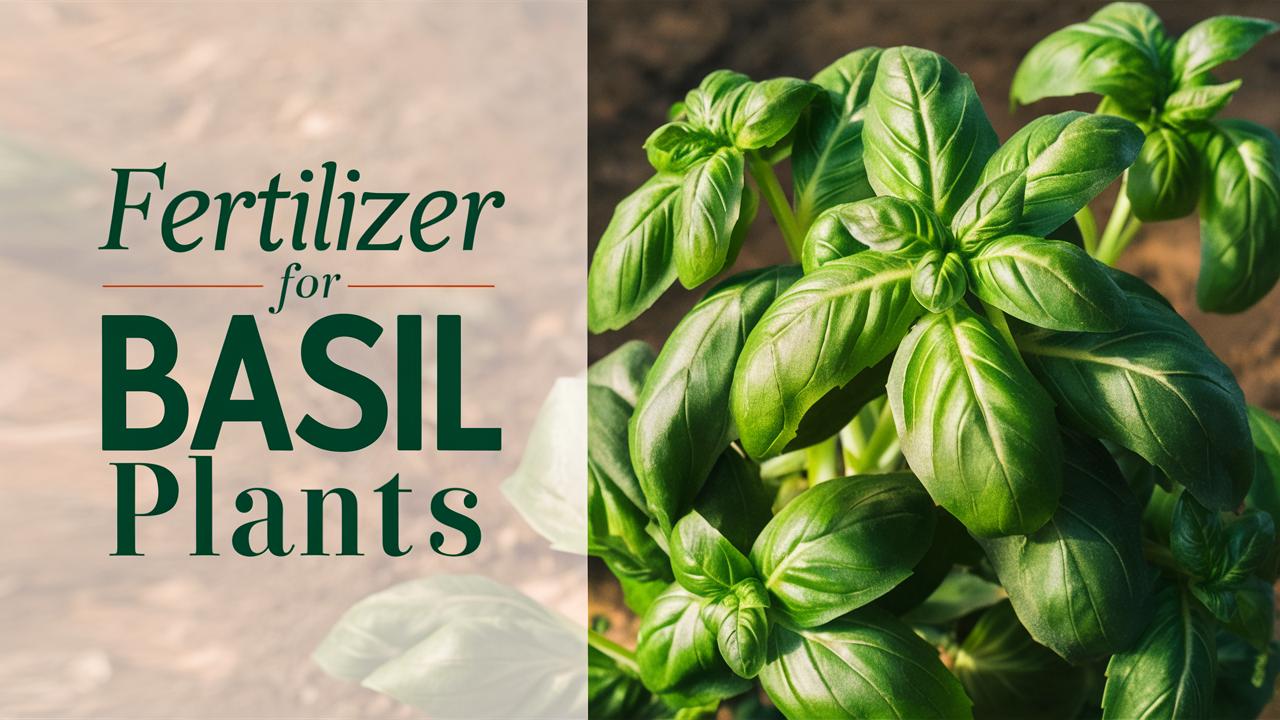In this comprehensive guide, we’ll explore the essential factors to consider when choosing fertilizer for basil, the types of fertilizers available, and the best practices for applying them to ensure your basil thrives.
Fertilizer For Basil Plants
| Image | Name | Rating | Shop |
|---|---|---|---|
 | Herb Plant Food |  | |
 | Organic Plant Magic |  | |
 | True Organic Herb & Leafy Greens Food |  |
Herb Plant Food
Basil plants require a nutrient-rich fertilizer to promote healthy growth and pest resistance. For edibles like basil, it’s essential to use a plant food specifically designed for edible herbs.
TPS NUTRIENTS Herb Plant Food is an excellent option for maintaining your basil plant’s health. This liquid houseplant fertilizer provides a balanced mix of nutrients that encourages leafy growth and root development in all types of edibles, including leafy greens and veggies. With its 32-oz (1 quart) size, you can easily meet the nutritional needs of multiple plants at once.
Organic Plant Magic
This reviewer has found success with the Organic Plant Magic soluble fertilizer concentrate on their basil plants. The formula is easy to use – simply sprinkle onto the soil and water as normal.
The benefits of using Organic Plant Magic for your basil plants are numerous, including increased growth, vibrant color, and intense flavor. This versatile all-purpose powder provides every essential plant nutrient plus 55+ trace minerals, helping your basil plants express their full genetic potential.
True Organic Herb & Leafy Greens Food
For basil plants looking for a boost, consider using True Organic Herb & Leafy Greens Food as an fertilizer option. This product is specifically designed to support lush growth in herbs and leafy greens.
This organic fertilizer contains a nutrient-rich formula that provides balanced nutrition with 4% nitrogen, 4% phosphate, 6% potash, 7% calcium, and 1% sulfur. It features an exclusive blend of organic ingredients including seabird guano, shrimp and crab shell meal, poultry manure, and more. Apply it monthly during the growing season for consistent results.
Leafy Plant Food
Basil plants will benefit from regular feeding using Leafy Plant Food for Houseplants. This gentle fertilizer formula provides a balanced NPK ratio and essential minerals to promote healthy growth and flowering.
This product is particularly well-suited for basil due to its mycorrhizal fungi properties, which help improve nutrient uptake and reduce watering frequency. The specialized formula also minimizes transplant shock and promotes robust growth in all plant varieties, making it a good investment for anyone looking to keep their basil plants healthy and thriving.
Burpee’s All-Purpose Organic Plant Food
If you’re looking for a high-quality fertilizer for your basil plants, we recommend using Burpee Natural Purpose Granular 4-Lb Organic Food. This all-purpose organic plant food is specifically designed to keep your plants growing and happy throughout the season. With its custom blend of major nutrients, calcium, minor nutrients, and beneficial microbes, it’s perfect for seed starting, bedding plants, vegetable gardens, and even containers.
We’ve chosen this product because of its OMRI-listed organic certification, ensuring that it safely promotes soil and plant health without any harsh chemicals. The easy-to-apply granules release essential nutrients quickly, delivering fast results and encouraging healthy growth, blooms, and fruit production in your basil plants. Try Burpee Natural Purpose Granular 4-Lb Organic Food for a natural fertilizer that will help you grow the best garden possible.
BloomPlus Organic Fertilizer
Folks who grow basil might want to consider using Dr. Earth Organic 5 Tomato, Vegetable & Herb Fertilizer Poly Bag to give their plants an extra boost. This product claims to have optimum levels of primary plant nutrients which would be great for promoting healthy growth in basil.
Some users reported that it feeds the plants for several months and is made with 100% organic ingredients including beneficial soil microbes, making it a great option for those looking for an all-natural fertilizer. The added pro-biotic beneficial soil microbes may also help to improve the overall health of the plant leading to more abundant crops.
Understanding Basil’s Nutritional Needs
Before diving into the specific types of fertilizer, it’s crucial to understand the basic nutritional needs of basil. Basil plants are leafy herbs that require a balanced intake of nutrients to flourish. Primarily, they need nitrogen (N), phosphorus (P), and potassium (K), commonly referred to as the N-P-K ratio.
Nitrogen (N): This nutrient promotes leaf growth, which is vital for basil, known for its lush foliage. A nitrogen-heavy fertilizer can enhance leaf production, which is essential for culinary use.
Phosphorus (P): Phosphorus supports root development and is crucial during the flowering stage. While basil is primarily valued for its leaves, healthy roots contribute to overall plant vigor.
Potassium (K): Potassium helps strengthen the plant’s cellular structure, enabling better resistance to diseases and environmental stress. It also helps in synthesizing essential oils, which enhance the aroma and flavor of basil.
The Importance of Soil Testing
Before selecting a fertilizer, it’s wise to conduct a soil test. Understanding your soil’s current nutrient composition can help you choose a fertilizer that supplements any deficiencies. Soil testing kits are available at garden centers or online, and they can provide valuable insights into the pH level and nutrient content of your soil.
Recommendation: Aim for a pH level between 6.0 and 7.0 for optimal basil growth. If your soil is too acidic or alkaline, consider adjusting the pH with lime or sulfur before fertilizing.
Types of Fertilizers for Basil
When it comes to fertilizers, there are various options available, each with its own benefits and application methods. Let’s explore these options in detail.
1. Organic Fertilizers
Organic fertilizers are derived from natural sources and are often preferred by gardeners looking for eco-friendly options. They improve soil health over time and enhance fertility without introducing synthetic chemicals.
Compost: One of the best organic fertilizers available, compost enriches the soil with a broad spectrum of nutrients while also improving soil structure. Incorporating well-rotted compost into your soil from the beginning will provide a steady supply of nutrients as the plants grow.
Fish Emulsion: This liquid fertilizer is high in nitrogen and is an excellent source for fast-growing basil. Dilute it according to package instructions and apply it every two weeks during the growing season.
Bone Meal: Rich in phosphorus, bone meal can help strengthen root development and improve flower formation. Mix it into the soil when planting, or use it as a top dressing during the growing season.
Kelp Meal: Kelp is rich in potassium and micronutrients, making it an excellent choice for strengthening plants and enhancing overall resilience.
2. Synthetic Fertilizers
Synthetic or chemical fertilizers are engineered to provide immediate nutrient availability. They can be more concentrated and can supply nutrients quickly, making them ideal for quick fixes.
Balanced Fertilizers: Fertilizers with balanced N-P-K ratios (e.g., 10-10-10 or 20-20-20) provide equal proportions of nitrogen, phosphorus, and potassium. These are great for basil plants during vigorous growth periods.
Slow-Release Fertilizers: These fertilizers gradually release nutrients over time, providing sustained nourishment. They can be beneficial for busy gardeners, as they require less frequent application.
3. Liquid Fertilizers
Liquid fertilizers can be organic or synthetic and are designed for quick absorption. They are particularly useful for container gardening or when foliage diseases impact growth.
Fertilizer Solutions: Liquid fertilizers like 5-10-5 can provide an effective boost when applied every few weeks. They penetrate foliage, enabling plants to draw nutrients directly.
Timing of Fertilization
The timing of fertilizer application is paramount to fostering optimal basil growth.
1. Pre-planting Preparation: Start with amending the soil with compost or organic matter before planting. This step improves drainage, encourages beneficial microorganisms, and provides an initial nutrient boost.
2. During Early Growth: As basil begins to sprout, consider applying a nitrogen-rich fertilizer. This will encourage bushy foliage development during its formative stages.
3. Mid-Season Feeding: When your basil plants are actively growing, applying a balanced fertilizer or a liquid fertilizing regimen can help sustain growth. This is especially important during the peak growing season of spring and summer when basil is actively producing new leaves.
4. Pre-harvest Considerations: Avoid high-nitrogen fertilizers right before harvesting, as this can lead to overly lush foliage with lower essential oil content. Instead, focus on potassium to enhance flavor.
Best Practices for Applying Fertilizers
Applying fertilizer correctly is just as important as choosing the right one. Here are some best practices to keep in mind:
1. Follow Manufacturer Instructions
Whether you’re using organic or synthetic fertilizers, it’s vital to read and adhere to the instructions on the label. Over-fertilizing can lead to nutrient burn, which can damage the plants and affect overall health.
2. Water Before Fertilizing
For both liquid and granular fertilizers, it’s wise to water the soil before application. Fertilizer interacts better with moistened soil, ensuring that nutrients are drawn into the root zone without causing shock to the plants.
3. Avoid Applying Fertilizer on Dry Soil
Applying fertilizer on dry soil can increase the risk of root burn, as the concentrated nutrients can harm delicate root systems. Watering the day before helps mitigate this risk.
4. Monitor Plant Responses
Keep a close eye on your basil plants after applying fertilizer. Healthy basil should exhibit vibrant green leaves and steady growth. If you notice discoloration (yellowing or browning) or wilting, it could indicate nutrient imbalances that need addressing.
Troubleshooting Nutrient Deficiencies
Despite careful fertilization, basil plants may exhibit signs of nutrient deficiency. Here’s how to identify and address common deficiencies:
1. Nitrogen Deficiency
Symptoms: Yellowing of older leaves, sparse growth.
Solution: Apply a nitrogen-rich fertilizer, such as fish emulsion, or an organic option like alfalfa meal.
2. Phosphorus Deficiency
Symptoms: Stunted growth, dark green or purple-tinged leaves.
Solution: Incorporate bone meal or rock phosphate into the soil, particularly when transplanting.
3. Potassium Deficiency
Symptoms: Marginal leaf burn and poor fruit/crop development.
Solution: Apply a potassium-rich fertilizer or a balanced fertilizer to replenish nutrients.
Conclusion: Tailoring Fertilization to Your Success
Choosing the right fertilizer for your basil plants can make all the difference in achieving a bountiful harvest. By understanding the nutritional needs of basil, testing your soil, and selecting from various organic and synthetic options, you can craft a tailored fertilization regimen that meets the specific demands of your plants.








